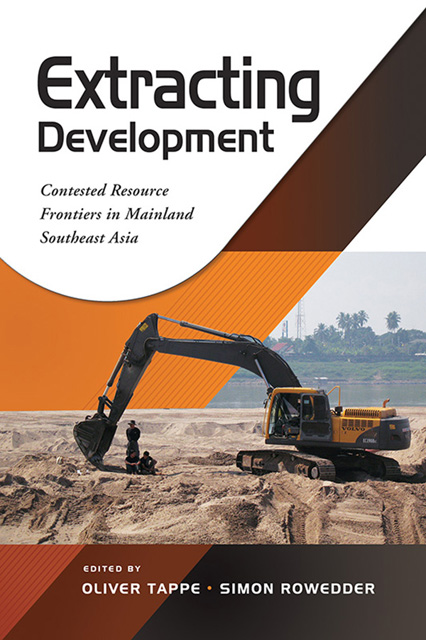Book contents
- Frontmatter
- Contents
- Acknowledgements
- The Contributors
- 1 Contested Resource Frontiers in Mainland Southeast Asia: An Introduction
- 2 Ontological Politics of the Resource Frontier: A Hydrosocial Analysis of the Mekong River in Northern Thailand
- 3 Reassembling Frontiers for Middle-Income Peasants: Rubber Expansion and Livelihood Ecosystem Transformation in a Northeast Thai Village
- 4 “Only the Best Fruits for China!”: Local Productions of a ‘Fruit Frontier’ in the Borderlands of China, Laos and Thailand
- 5 Commodity Frontiers in Motion: Tracing the Maize Boom across the Lao-Vietnamese Borderlands
- 6 New Frontier Spaces: Complex Entanglements and Power Relations (Re)shaping Land Governance in Laos
- 7 Moving Away from the Margins? How a Chinese Hydropower Project Made a Lao Community Modern and Comfortable
- 8 Frontier Capitalism in Colonial and Contemporary Laos: The Case of Tin Mining
- 9 Chinese Investments and Resource Frontiers in Cambodia: Systemic Transformation
- 10 The Open Issues: Cases between Chinese Investment Companies and Local People in Myanmar
- 11 Internationalization of RMB and Tin Ore Trade in China-Myanmar Frontier Governance: Views from Yunnan Province
- Index
6 - New Frontier Spaces: Complex Entanglements and Power Relations (Re)shaping Land Governance in Laos
Published online by Cambridge University Press: 30 June 2023
- Frontmatter
- Contents
- Acknowledgements
- The Contributors
- 1 Contested Resource Frontiers in Mainland Southeast Asia: An Introduction
- 2 Ontological Politics of the Resource Frontier: A Hydrosocial Analysis of the Mekong River in Northern Thailand
- 3 Reassembling Frontiers for Middle-Income Peasants: Rubber Expansion and Livelihood Ecosystem Transformation in a Northeast Thai Village
- 4 “Only the Best Fruits for China!”: Local Productions of a ‘Fruit Frontier’ in the Borderlands of China, Laos and Thailand
- 5 Commodity Frontiers in Motion: Tracing the Maize Boom across the Lao-Vietnamese Borderlands
- 6 New Frontier Spaces: Complex Entanglements and Power Relations (Re)shaping Land Governance in Laos
- 7 Moving Away from the Margins? How a Chinese Hydropower Project Made a Lao Community Modern and Comfortable
- 8 Frontier Capitalism in Colonial and Contemporary Laos: The Case of Tin Mining
- 9 Chinese Investments and Resource Frontiers in Cambodia: Systemic Transformation
- 10 The Open Issues: Cases between Chinese Investment Companies and Local People in Myanmar
- 11 Internationalization of RMB and Tin Ore Trade in China-Myanmar Frontier Governance: Views from Yunnan Province
- Index
Summary
INTRODUCTION
Land, and the way it is governed in Laos, reflects its central positioning for the country's socio-economic development and how the state views it predominantly as an economic asset and extractive resource. Increasing commodification of land and other natural resources has also manifested in the state's territorialization approach and strategies that have sought to reorder relationships between people, land, and the natural environment in ways that facilitate state aims of political control while also promoting economic development. Since the country's independence in 1975, the state has been focusing on various policies to sustain, expand and strengthen its political control. These policies include internal resettlement (Baird and Shoemaker 2005; Évrard and Goudineau 2004; Ponce, this volume), land use planning and land allocation programme (Lestrelin 2010; Rigg 2005), as well as various forms of land commodification through the granting of state land concession (Kenney-Lazar, Dwyer, and Hett 2018; Kenney-Lazar 2019).
In this chapter, we look at the interplay between the state's territorialization approach and strategies and the (re)shaping of frontier dynamics which (un)make the Lao uplands (Kramp, Suhardiman, and Keovilignavong 2020). Rasmussen and Lund (2018) have advocated for a bifocal perspective of territorialization and frontier dynamics, making visible their interplay in (re)configuring space, property relations and institutional arrangements. Both concepts have been used by scholars to analyse and discuss the transformations of upland areas across Southeast Asia (Barney 2009; Diepart and Sem 2018; Hall, Hirsch, and Li 2011). Scholars have also shown how territorial politics shape institutional structures (Bolleyer 2018; Keating 2018) and public policies (Agnew and Mantegna 2018). In Laos, and the region in general, state's territorialization approaches and the (re)shaping of frontier dynamics are most apparent in how states “divide their territories into complex and overlapping political and economic zones, rearrange people and resources within these units, and create regulations delineating how and by whom these areas can be used” (Vandergeest and Peluso 1995, p. 387).
Building on these works, we identify two venues where new frontier spaces emerged and took shape: policy formulation processes and programme implementation. First, we show how the process of (re)creating space, or the unfolding of frontier dynamics, has entered policymaking arenas drawing on the case of the national master plan on land allocation (NMPLA) formulation process.
- Type
- Chapter
- Information
- Extracting DevelopmentContested Resource Frontiers in Mainland Southeast Asia, pp. 129 - 142Publisher: ISEAS–Yusof Ishak InstitutePrint publication year: 2022



